Many reptile owners wonder, can bearded dragons have basil in their diet. The answer is yes, but only in moderation. Basil provides important vitamins and antioxidants for your beardie. However, feeding basil too often can cause health problems like digestive upset or vitamin A toxicity. In this article, you will learn how to safely include basil in your bearded dragon’s meals. We cover how often you can feed basil and the best way to prepare it. If you want to know can bearded dragons have basil without risk, this guide will help you make the right choices.
Can Bearded Dragons Have Basil Safely?
Yes, bearded dragons can enjoy basil, but it’s best served sparingly—about once per week. Unlike staple greens, basil should be treated as a tasty supplement, not a daily meal replacement. Using it occasionally adds diversity to your pet’s diet without risking nutritional overload.
Maintaining a varied herb and green rotation is crucial for your bearded dragon’s health. Feeding the same few plants repeatedly can cause imbalances or deficiencies. Including basil alongside other safe herbs helps ensure your beardie receives a broad range of nutrients essential for vitality.
But greens and herbs are just one part of the picture. Bearded dragons also require a consistent supply of live insects for protein, energy, and natural enrichment. For a complete view of options, check out the ultimate list of insects bearded dragons can eat safely. It’s an essential companion to herb-based feeding.
Basil is packed with valuable nutrients, including:
- Vitamins A, C, E, and K: Vital for supporting eyesight, immune defenses, and cell repair.
- Powerful antioxidants: These help neutralize harmful free radicals, promoting overall wellness.
- Dietary fiber: Important for smooth digestion and preventing constipation.
- Natural antibacterial and anti-inflammatory compounds: These properties may support your dragon’s immune system and soothe minor irritations.
🧠 Helpful tip: Even though basil is nutritious, it’s no substitute for your bearded dragon’s main leafy greens like collards or mustard greens. These staples provide the calcium and minerals that basil alone cannot fully supply. Use basil to complement, not replace, their core diet.e calcium and minerals that basil alone cannot fully supply. Use basil to complement, not replace, their core diet.
Nutritional Benefits of Basil for Bearded Dragons
What’s Inside One Tablespoon of Fresh Basil?
Basil may seem like a simple herb, but it contains several important nutrients that can benefit your bearded dragon when fed in moderation. Here’s a quick look at what you get from just one tablespoon of fresh basil leaves:
- Vitamin A (280 IU): This vitamin supports your beardie’s vision, skin health, and immune system. Vitamin A is vital for cell growth and repair, but too much can be harmful.
- Vitamin C (0.95 mg): Vitamin C helps strengthen the immune system and supports various cell functions in your pet’s body.
- Calcium (8.2 mg): Calcium is essential for strong bones and proper muscle function. Basil provides a modest amount to support these needs.
- Phosphorus (3.6 mg): This mineral plays a role in bone health and energy production. However, it’s important to keep calcium and phosphorus balanced.
- Fiber (0.2 g): Fiber aids digestion and helps maintain a healthy gut for your bearded dragon.
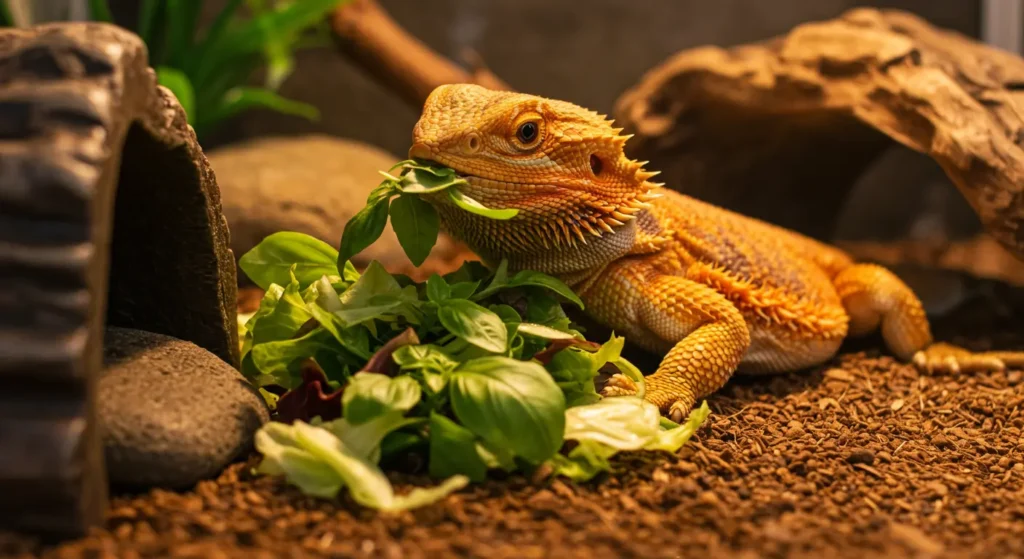
Calcium-to-Phosphorus Ratio in Basil
One key factor in reptile nutrition is the calcium-to-phosphorus (Ca:P) ratio. For bearded dragons, a ratio above 1:1 is ideal because calcium supports bone growth and phosphorus can inhibit calcium absorption if too high.
- Basil’s Ca:P ratio is approximately 2.2:1. This is a good ratio and makes basil a beneficial herb in moderation.
- When comparing basil to other greens:
- Dandelion greens have a ratio around 2.9:1, which is excellent.
- Collard greens are about 3.6:1, making them a top choice for calcium.
- Parsley sits around 2.4:1 but contains high oxalates, so should be fed sparingly.
Maintaining proper Ca:P balance helps prevent metabolic bone disease, a common problem in captive reptiles caused by calcium deficiency.
How to Prepare Basil for Your Bearded Dragon
Step-by-Step Feeding Guide
Feeding basil to your bearded dragon requires a few simple steps to ensure safety and maximize nutrition. Start by thoroughly washing the basil leaves. This helps remove any pesticides, dirt, or harmful chemicals that might be on the herb. Use cool, running water and gently rinse each leaf.
Next, always use fresh basil. Avoid dried basil, as it can be too strong and concentrated for your dragon’s sensitive digestive system. Fresh basil is softer and more hydrating, making it easier for your bearded dragon to digest.
Once washed, chop the basil leaves finely or tear them into small pieces by hand. Smaller pieces are easier for your beardie to eat and help prevent choking. You can mix the chopped basil with staple greens such as collard or mustard greens. Alternatively, sprinkle the basil on top as a flavorful garnish to encourage your pet to try it.
Can Bearded Dragons Have Basil Fresh or Dried?
- ✅ Fresh basil is the best choice. It is gentle on the stomach and retains most of its vitamins and antioxidants.
- ❌ Dried basil is not recommended. The drying process concentrates acids and oils, which can upset your dragon’s digestion. Dried herbs may cause stomach pain or diarrhea.
Feeding fresh basil occasionally adds variety to your bearded dragon’s diet without risking digestive issues. Always observe how your pet reacts and remove any uneaten basil promptly to prevent spoilage.
Can Baby Bearded Dragons Have Basil?
Baby bearded dragons can have basil, but only very sparingly and in small amounts. Their young digestive systems are delicate and not yet equipped to handle certain herbs regularly. Because of this, basil should be treated as an occasional treat rather than a daily food.
At this early stage, it’s crucial to focus on feeding calcium-rich greens like collard, mustard, and dandelion greens. These provide the necessary nutrients for strong bone development and overall health. Basil, while beneficial in small doses, lacks the calcium content to be a staple food for babies.
If your baby bearded dragon is already receiving a Vitamin A supplement, it’s best to avoid basil altogether. Basil contains Vitamin A, and too much can lead to toxicity, which may cause serious health issues such as swelling or organ damage.
In summary, stick to calcium-dense leafy greens for your baby beardie and reserve basil for occasional use once your dragon’s digestive system matures and can better tolerate diverse foods. Always watch for any adverse reactions after introducing basil or any new herb.
Can Bearded Dragons Have Basil Every Day?
The Risk of Overfeeding Basil
Feeding basil to your bearded dragon every day is not recommended. Basil contains a high amount of Vitamin A. If combined with Vitamin A supplements, this can lead to toxicity. Vitamin A toxicity is dangerous and can harm your pet’s liver and other organs.
Signs your bearded dragon may be eating too much basil include diarrhea, bloating, and refusing to eat. These symptoms indicate your pet’s digestive system is upset or overwhelmed. If you notice any of these signs, reduce or stop feeding basil immediately. For more information on appetite issues and what to do when your bearded dragon stops eating, check out Why Is My Bearded Dragon Not Eating? Top 5 Reasons.
To avoid risks, rotate basil with safer herbs. Rosemary, chicory, and fennel are excellent alternatives. They provide nutrients without the same Vitamin A concerns.
Watch Out for These Feeding Mistakes
Some common feeding errors can worsen health risks. Avoid using wilted or dried basil leaves. Wilted leaves lose nutritional value, and dried basil is too concentrated and acidic. Both can upset your beardie’s stomach.
Do not feed basil too frequently. Overfeeding any herb can cause nutritional imbalances. Finally, always watch your dragon’s reaction to new foods. If your pet shows discomfort or disinterest, stop feeding that herb.
By following these guidelines, you can safely include basil in your bearded dragon’s diet without overfeeding.
What Herbs Can Bearded Dragons Have Alongside Basil?
Feeding your bearded dragon a variety of herbs is one of the best ways to ensure balanced nutrition. While basil is safe in small amounts, rotating it with other herbs can help prevent vitamin or mineral imbalances and keep your dragon interested in its food.
Weekly Herbs to Rotate
These herbs are safe to offer once a week, just like basil. They add flavor and beneficial nutrients to your dragon’s salad without the risks that come with daily feeding.
- ✔️ Basil (2.2:1): Rich in vitamins A, C, E, and K. Also contains antioxidants and fiber.
- ✔️ Chicory (2:1): A great source of calcium and fiber, plus vitamins A and C for immune support.
- ✔️ Rosemary (4.8:1): High in calcium and fiber. A strong choice for digestion and bone health.
- ✔️ Fennel (1:1): Provides iron, potassium, magnesium, and a balanced calcium-phosphorus ratio.
- ✔️ Cilantro (1.4:1): Packed with antioxidants and antimicrobial compounds. Helps freshen breath and support digestion.
- ✔️ Lemongrass (1:1.5): Contains fiber and antioxidants. May support the immune system and reduce inflammation.
Rotating these herbs helps avoid overloading your dragon with one specific nutrient. It also keeps meals more enjoyable.
Herbs to Use Occasionally (Every 3–4 Weeks)
Some herbs are safe but should only be used occasionally. These are best fed once or twice a month due to certain compounds that can build up over time.
- ⚠️ Parsley: Contains beneficial nutrients but is high in oxalates, which can block calcium absorption.
- ⚠️ Mint (peppermint & spearmint): Has strong oils that may irritate the digestive tract in large amounts.
- ⚠️ Thyme: Safe in very small portions. It’s potent in flavor and medicinal properties, so use it carefully.
Limiting these herbs reduces the risk of kidney stress, calcium deficiency, or stomach upset.
Toxic Herbs to Avoid
The following herbs are unsafe for bearded dragons and should never be included in their diet. They can be harmful even in small amounts.
- ❌ Bay leaves: Belong to the laurel plant family, which is toxic to reptiles.
- ❌ Garlic: Too acidic and contains compounds that can damage red blood cells.
- ❌ Onion: Highly irritating to a bearded dragon’s digestive system.
- ❌ Chives: Like onions, they are too strong and can be toxic over time.
- ❌ Dill leaves: Contain oils and acids that may lead to digestive upset and irritation.
If you’re unsure about a particular herb, always check a reliable source or consult a reptile vet before feeding.
Can Bearded Dragons Have Basil in Their Tank?
Yes, bearded dragons can have live basil growing inside their tank, and it offers more than just decoration. Basil provides natural enrichment. It gives your pet something to see, smell, and even safely taste.
Using real plants like basil is a better option than plastic decor. Plastic plants can break apart and pose a choking hazard. Live basil is soft, safe, and edible in small amounts. However, basil doesn’t thrive in high heat for long. If your terrarium gets too warm, the plant may wilt or dry out quickly.
You also need to watch humidity levels. Live plants can raise moisture in the tank. This isn’t ideal for bearded dragons, who need a dry environment. Keep a hygrometer in the enclosure to make sure conditions stay balanced.
Always choose organic basil that’s free from pesticides or chemicals. Never use treated nursery plants. And most importantly, only grow non-toxic herbs your dragon can safely nibble on. Done right, basil can be a fun and natural addition to your bearded dragon’s habitat.
Frequently Asked Questions (FAQs)
Can Bearded Dragons Eat Basil Flowers or Stems?
Yes, basil flowers and stems can be fed, but only with care. The flowers are safe in small amounts. They can add variety to your dragon’s salad and may even boost interest in eating. However, avoid feeding large quantities, as they can be more fragrant and intense.
Soft basil stems are generally fine. If the stem feels tender and flexible, it’s safe for your bearded dragon to nibble on. Tough or woody stems, on the other hand, should be avoided. These are harder to chew and may pose a choking risk.
How Often Can Bearded Dragons Have Basil Safely?
Basil should only be given once per week. This limit helps prevent vitamin overload and digestive upset. For baby bearded dragons, it’s better to offer basil even less often—maybe once every two weeks.
Younger dragons have developing systems. They benefit more from staple greens rich in calcium than from herbs like basil.
Can Basil Cause Digestive Issues in Beardies?
Yes, basil can cause stomach problems in bearded dragons if it’s overfed. Too much basil may lead to bloating, soft stools, or diarrhea. This is especially true if the basil is dried. Dried basil is more acidic and concentrated, which makes it harder to digest.
Always monitor your dragon after introducing new herbs. If you notice changes in appetite or stool, pause basil feeding immediately.
What If My Bearded Dragon Refuses Basil?
If your bearded dragon doesn’t like basil, don’t worry at all. Basil is a supplementary herb. It’s not a required part of their diet. Your beardie can live a perfectly healthy life without ever eating basil.
Instead, try offering other safe herbs or greens. Some dragons enjoy cilantro, fennel, or rosemary more than basil. Every beardie has their own preferences, and that’s completely normal.
Final Verdict – Can Bearded Dragons Have Basil?
Yes, bearded dragons can have basil—but only in moderation. Fresh basil is packed with vitamins and antioxidants. It adds variety and flavor to your dragon’s meals, making it a fun, occasional treat.
However, basil should never be a daily food. It’s high in Vitamin A, which can build up and become harmful when combined with supplements or other vitamin-rich foods. Feeding basil once a week is more than enough.
Avoid dried basil completely. It’s too concentrated and may cause digestive issues like bloating or diarrhea. Always choose clean, organic, pesticide-free leaves.
For best results, rotate basil with other safe herbs like rosemary, cilantro, or chicory. This adds diversity to your dragon’s diet without causing imbalance.
In short, basil is safe, healthy, and beneficial—but only when used wisely. Keep portions small, serve it fresh, and always watch how your beardie reacts. A smart feeding routine will help your bearded dragon thrive.

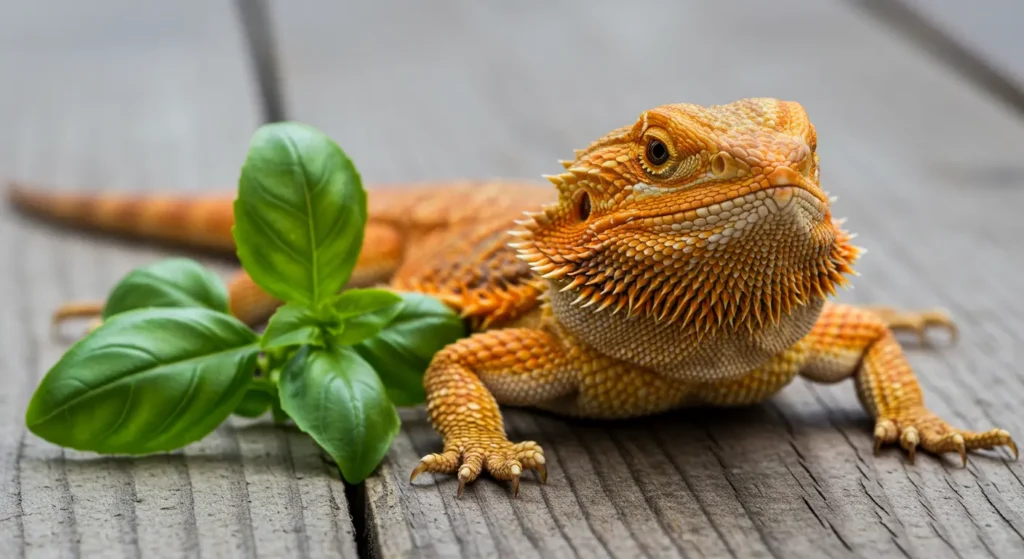
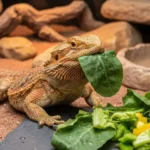
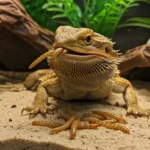

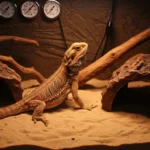
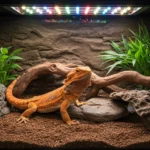
1 thought on “Can Bearded Dragons Have Basil? Safe Feeding Tips Inside”